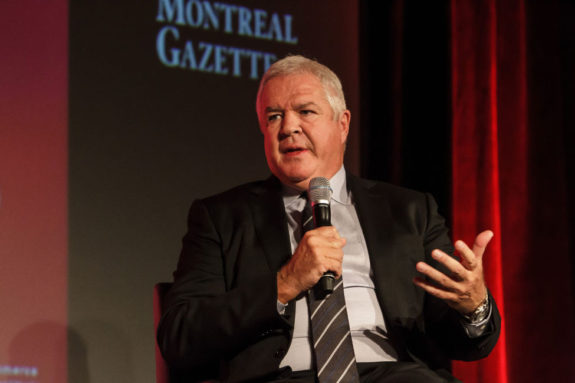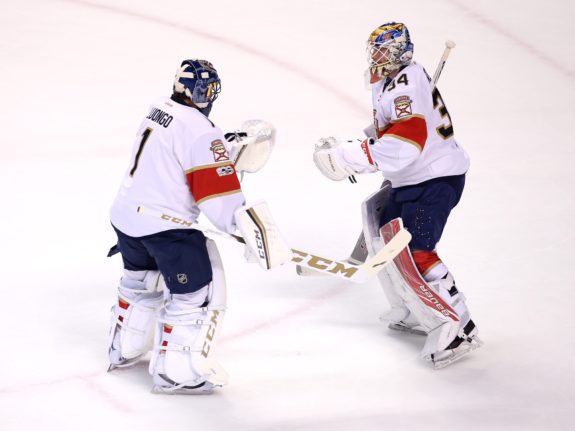The Florida Panthers’ salary cap situation gives them a window to win sooner than you might think. If you include GM Dale Tallon’s wildly successful (or maybe just wild) experiment of promoting Tom Rowe two years ago, we are entering his ninth season at the helm of this team. That leaves us considerably past the “Six-Year Blueprint” he promised in 2010.
Teams are turning things around faster and faster these days and “Six-Year Blueprint” is an impossible sell in today’s league. I needn’t remind you what the Vegas Golden Knights did last season. I argue that the Cats should go for it all, the Stanley Cup, as soon as the 2019-2020 season. Here’s why:
What’s on the Books
The Panthers roster looks fairly set for this season. Barring an unexpected deal, they will enter the year with $77.48 million committed to the cap, leaving just over $2 million available to spend. They appear comfortable with their position, too. The team finished last year with one of the best second-half records in the league and were just one point shy of qualifying for the postseason.

They have a log jam of forwards competing for bottom-six positions and at least eight defensemen could see significant playing time this season. The Panthers have depth at all positions, including in net after they gave a one-year deal to Michael Hutchinson on July 1.
What’s Coming off the Books
The team has ten roster players whose contracts expire at season’s end. How many do they want back? Hopefully the answer does not exceed four or five and they come in the form of young, still developing talent such as Denis Malgin and Mackenzie Weegar.
The players we can hope to say goodbye to include captain Derek MacKenzie, the unproductive Jamie McGinn, and known pylon Alex Petrovic. That’s a total of $6.6 million. If the Panthers opt not to sign others like Michael Haley or Frank Vatrano, they can have upwards of $10 million to spend. This money can be used to re-sign players like the aforementioned Malgin, or Maxim Mamin should he experience a breakout year, but those will be cheap.

The 2019-20 Season
At the bottom of their roster, the Panthers have a limited number of spots available to numerous forwards who have proven capable of competing at an NHL level. Additionally, Henrik Borgstrom will be in his second season and the final year of his entry-level deal. If 19-year-old Owen Tippett does not make the roster in 2018, there is no doubt he’ll make it in 2019-20.
This is all to say that the Panthers have the luxury of deploying highly effective bottom-six talent that costs little-to-nothing over the next few seasons. The league has been utilizing this model more and more. The Pittsburgh Penguins won their back-to-back Stanley Cups while devoting most of their cap room to Sidney Crosby, Evgeni Malkin, Phil Kessel, and Kris Letang while the rest of their lineup was filled out by youngsters and other lesser-known talent.
So… what are the Panthers’ options with this extra cash? Multiple reports indicate pending free agent Artemi Panarin’s desire to move on from Columbus into a larger, preferably coastal city. The Cats fit this bill and should make every effort to pursue any player of his caliber. He should command at least $8-9 million per season on a long-term contract, but the Panthers have this flexibility, especially while Aleksander Barkov, Vincent Trocheck, Jonathan Huberdeau, Mike Hoffman, Evgeni Dadonov, and Mike Matheson all have sub-$6 million cap hits.

All six of those players possess immense skill and are underpaid for the 2019-2020 season. The 2019-20 season, however, is the final one in which all six will be together under their current contracts and could be the final chance to add an elite talent such as Panarin to the group. Should he sign elsewhere, pending unrestricted free agent wingers Jeff Skinner or Mark Stone would be fine consolation prizes if they don’t re-sign with their respective clubs.
Problem Areas Beyond 2020
The Panthers are fortunate enough to have superstar forwards Huberdeau and Barkov signed long-term for $5.9 million and Trocheck long-term at $4.75 million. Defensemen Aaron Ekblad and Matheson are both signed for multiple years beyond 2020. These are staples to a championship team and the core that the Panthers hope to win with. Nevertheless, there are some pieces that will either not be available or will need a raise after 2020.
These include top-six forwards Hoffman and Dadonov in addition to Borgstrom if he continues improving as expected. With a Panarin contract on the books, the Panthers would not have the resources to retain them all. Panarin, Skinner, or Stone should be aggressively pursued in the next 11 months, but the team will take a step back in 2020 when they most likely lose at least two good forwards.
We’re left with one more problem that has been mentioned everywhere else but this article thus far: goaltending. After 2020, Roberto Luongo will be 41 years old, and James Reimer will have one year left on his contract. Reimer has proven to be a fabulous 1B goaltender in Florida, but at no point has he proven to be a bona fide starter. An enormous question to arise recently has been, “Who will be Luongo’s successor?”

A final staple to championship teams over the last 10 years has been an outstanding number one goaltender. It is hard to say whether Panthers’ top goalie prospect Sam Montembeault will ever be ready to take the starting reins, and not much points to Reimer proving capable, so what are they to do? It looks like the they could have two years to come up with an answer.
After that, there is goalie uncertainty and hard contract decisions to be made. The promising young core of this team may suffer some casualties and have a little different look than it does today. Though with the addition of one or two more significant pieces, Luongo and Reimer should be good enough to backstop the 2019 or 2020 Panthers to a Stanley Cup.